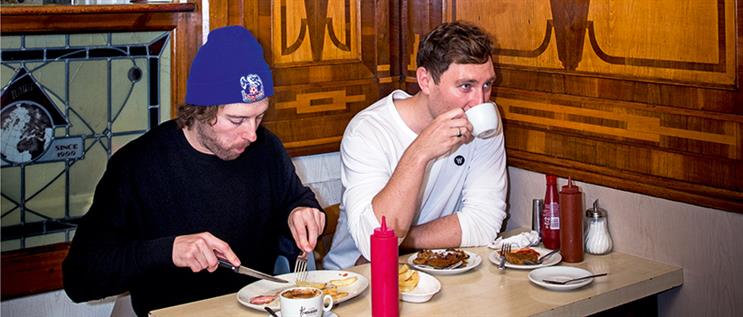Tom Bender would like to clarify something. When interviewed in June for a 北京赛车pk10 feature on Britain's future creative leaders, Tom Bender (pictured above, left) said: "I want to make this a rock and roll industry." Now Bender regrets his choice of words, calling it "the most cringe statement of all time". He meant that he doesn't want to feel ashamed of working in advertising.
"I went to art school and I didn’t study advertising. It felt like an easy way out at the time, when people were like, go and be ‘true artists’," he says. "But when you see the potential of the work you can do, legitimising this as a creative industry more would be a brilliant goal."
Cringe statements aside, Bender and his partner, Tom Corcoran, deserve the spotlight now. They created Nike’s barnstorming "Nothing beats a Londoner", and later Three’s "Phones are good". "It’s definitely our best year," Corcoran says. But it was a long road to get here.
For the Wieden & Kennedy London team, 2018 started with a gruelling shoot during winter: early mornings and late nights in Brixton, Peckham and Dalston; heated arguments; a case of shingles and a case of Norovirus; exhaustion. "Everyone went a bit crazy," Corcoran recalls.
They had a hunch that what they were making would be well-received, but not like this. Nike’s ad, which featured 258 real young Londoners plus celebrity cameos from the likes of Mo Farah and Skepta, went viral immediately. It swept industry awards, including nabbing a Cannes Grand Prix. It became the rare ad that pierces culture.
Yet its creators didn’t plan to go into advertising. After studying industrial design at Central Saint Martins, Bender says "it all just fell apart". He spent a few years living at home, delivering pizzas and fitting kitchens before turning to advertising out of "desperation", he quips.
Meanwhile, Corcoran studied English at the University of Manchester and ended up working in PR. "I was calling journalists every day and asking them what they were up to. I got told to fuck off about 20,000 times," he recalls. "I was like, I need to stop asking them what they’re doing. I want to do something."
They met at the School of Communication Arts, where Bender was impressed by Corcoran’s writing abilities. Corcoran says Bender’s work stood out because "everything in it made you feel something. Whether that was good or bad or you were annoyed, it wasn’t just wallpaper."
"We weren’t the best guys at the school, but we both were doing work that wasn’t trying to be ads," Bender says.
After stints at Crispin Porter & Bogusky and Droga5 London, the pair landed at Wieden & Kennedy. To this day, they swear they are not friends and "argue all day", according to Bender. "If I’m pretending I agree because I care about his feelings, that would be bad for creativity," Bender says. "All I want to do is work in a space where it’s totally free and open and we can talk about any issue."
Some of their worst arguments happened during the Nike production, but they don’t hold on to animosity. And those struggles don’t come through in the work. Bender and Corcoran believe that the commercial resonated so deeply because it celebrated a misrepresented population during a time of political unrest, upholding the kids as heroes rather than the athletes.
Then came the brief for Three. Despite their accolades for Nike, Bender says: "We’d rather do something new and fail than do the same thing off the coattails of that." But like Nike, Three’s ad took a common narrative – in this case, about smartphones damaging society – and flipped it. The film reimagines historic scenarios, such as the Titanic sinking, as if phones had existed and saved the day.
"There’s a truth to both bits of work, and they’re consumer first," Bender says of Nike and Three. "When it’s honest, and if there’s a tension in that, then you notice."
Both campaigns also disprove the notion that advertising is dying out, Bender says.
"No-one can predict where [advertising] is going, but there are new avenues in how we can apply our creativity that will open amazing opportunities for everybody," he says. "It’s just giving people the confidence to go out and try new things and see what happens."
After this year, Bender and Corcoran have the confidence to continue that journey. That primarily comes from knowing "you’ve got a kid on the bus talking about your work", Corcoran says.
So Bender and Corcoran may never be rock stars, but perhaps some kid on the bus has seen an ad like Nike’s, and thought: "I want to do that too."
Tom Bender and Tom Corcoran are creatives at Wieden & Kennedy London



